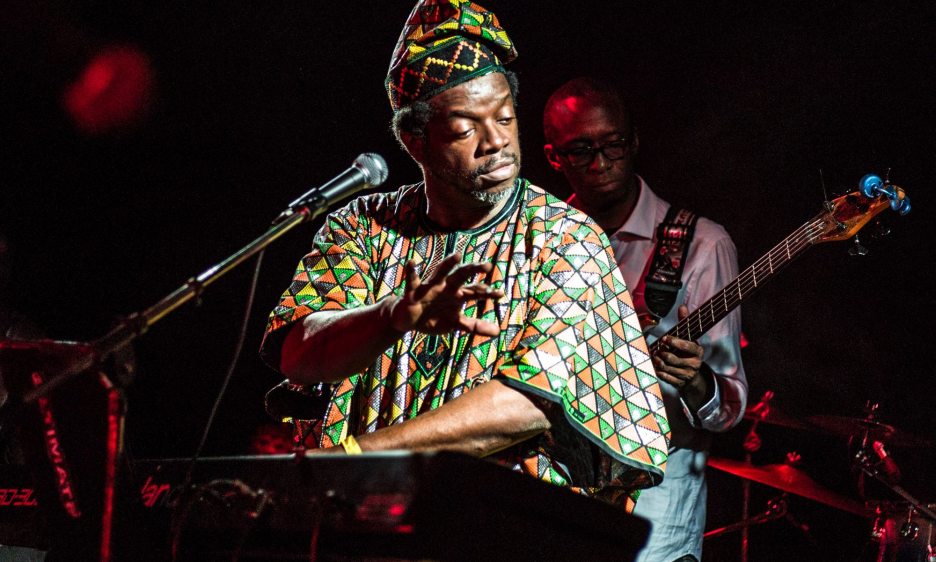Home » Jazz Articles » Live Review » Dele Sosimi & Friends At Ronnie Scott's Club
Dele Sosimi & Friends At Ronnie Scott's Club

If dangled upside down over a fire and called Horatio, one might single out Tony Allen’s 'Don’t Fight' for Kishon Khan’s intoxicating rumba-meets-Cecil-Taylor acoustic piano solo, and Fela Kuti’s 'Zombie' for Tamar Osborn’s viscerally off-the-scale baritone rampage.
Ronnie Scott's Club
London
June 11, 2023
Born in London but brought up in Lagos, keyboard player Dele Sosimi was a child prodigy who joined Fela Kuti's Egypt 80 the moment he left secondary school in 1979. Sosimi had by that time been rehearsing with Egypt 80 for over a year, but Kuti had insisted he finished his schooling before officially joining the band. (Kuti had taken Sosimi under his wing following the establishment-organised murder of Sosimi's father, who had been investigating high-level financial corruption in Nigeria, and he took his in loco parentis responsibilities seriously.)
After leaving Egypt 80 in 1986 along with his friend and onetime school classmate, saxophonist Femi Kuti, Fela's oldest son, Sosimi became the musical director of Femi's The Positive Force. After leaving that band in 1994, he returned to London.
Tonight's gig at Ronnie Scott's was in effect a celebration of Sosimi's multi-hued but interconnected activities in London. These include his leadership of the fifteen-piece Afrobeat Orchestra, which has kept the music's flame red hot in London since the late 1990s; his various, smaller, jazz groups; and his association with another large ensemble, Lokkhi Terra, founded by fellow keyboard player Kishon Khan in 2005, and whose Cubafrobeat (Funkiwala, 2018), which features Sosimi, is an album of singularly thrilling complexion (check the YouTube below for a taste).
Each of these bands was represented in the all-star septet Sosimi brought to Ronnie Scott's, most of the musicians being members of two or three of the lineups. Sosimi played electric keyboards and acoustic piano, as did Kishon Khan; Richard Olatunde Baker was on congas and percussion; Justin Thurgur on trombone; Tamar Osborn, the leader of her own acclaimed Collocutor band, on baritone saxophone (see here for an interview Osborn gave to AAJ in 2020); Nick Walters on trumpet; Suman Joshi on bass; and Kunle Olofinjana on drums.
Two hours of highly charged but nuanced music kicked off with a steaming performance of Sosimi's "Omo Mo Gba Ti E" from the Afrobeat Orchestra's sophomore album, Identity (Helico, 2007). More tunes by Sosimi followed, including a couple from his 2023 album The Confluence (Wah Wah 45s), along with others by Fela Kuti and Tony Allen, in whose bands Sosimi often played. All seven members of the band are accomplished players, both as section members (the horn section tonight was as tight as any in James Brown's bands), and soloists, and it is near impossible to pick out particular highlights. But if dangled upside down over a fire and called Horatio, one might mention Tony Allen's "Don't Fight," for Richard Baker's congas break and Kishon Khan's intoxicating rumba-meets-Cecil Taylor acoustic piano solo, and Fela Kuti's "Zombie," for Tamar Osborn's booting, bottom end, viscerally off-the-scale baritone rampage.
< Previous
The '70s with Mahavishnu Orchestra, r...
Comments
Tags
Live Review
Dele Sosimi
Chris May
United Kingdom
Fela Kuti
Egypt 80
Femi Kuti
The Positive Force
Ronnie Scott
Lokkhi Terra
Kishon Khan
Afla Sackey
Justin Thurgur
Tamar Osborn
Collocutor
Nick Walters
Kunle Olofinjana
Tony Allen
James Brown
Cecil Taylor
For the Love of Jazz
 All About Jazz has been a pillar of jazz since 1995, championing it as an art form and, more importantly, supporting the musicians who create it. Our enduring commitment has made "AAJ" one of the most culturally important websites of its kind, read by hundreds of thousands of fans, musicians and industry figures every month.
All About Jazz has been a pillar of jazz since 1995, championing it as an art form and, more importantly, supporting the musicians who create it. Our enduring commitment has made "AAJ" one of the most culturally important websites of its kind, read by hundreds of thousands of fans, musicians and industry figures every month.























